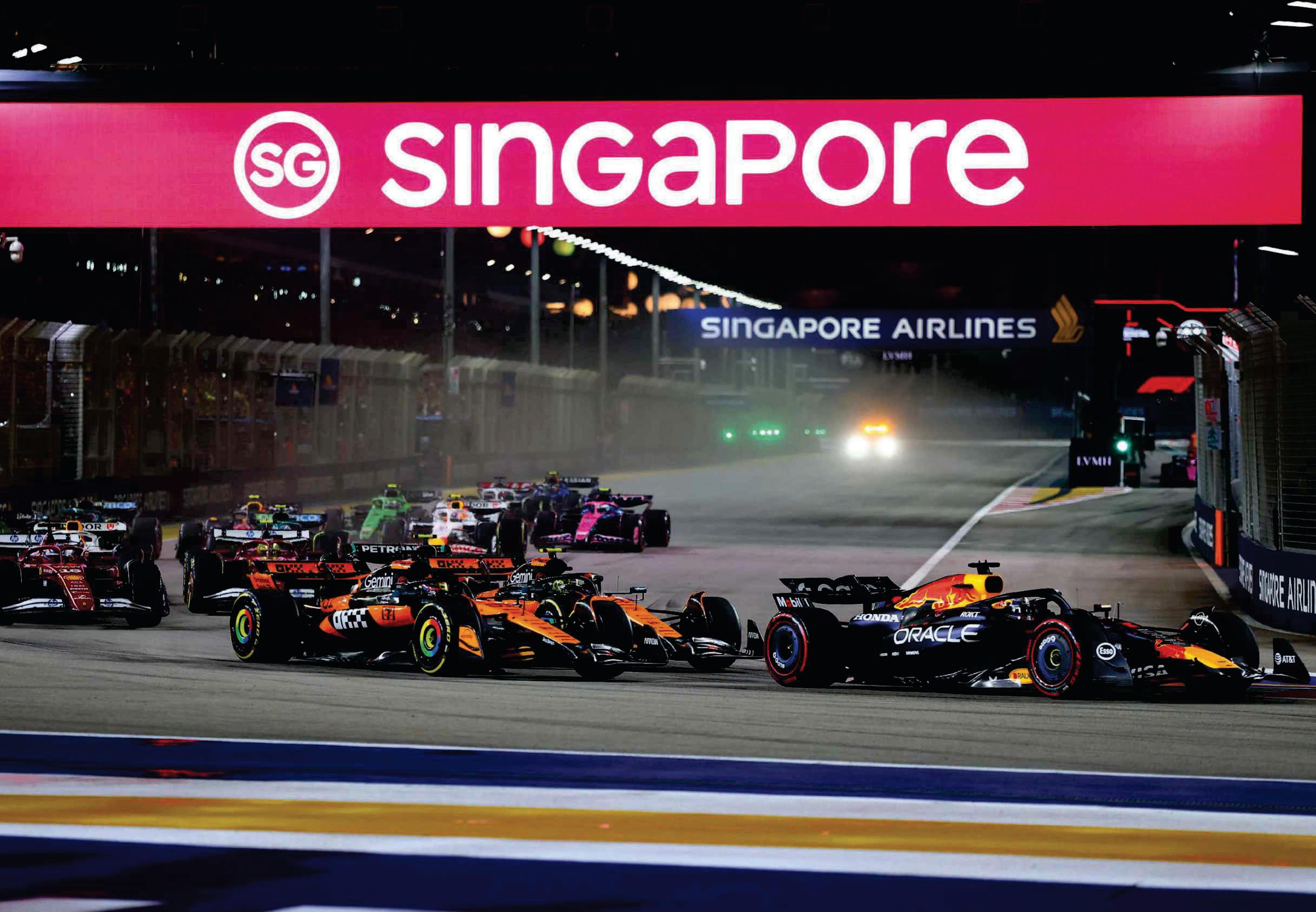Essayer OR - Gratuit
Cleaner, greener fuels are coming to Formula 1. Here's what that means
BBC Science Focus
|November 2025
The 2026 F1 championship will be raced using 'sustainable' fuels. But how much of a difference will it actually make to the sport's carbon footprint?

Next year, Formula 1 (F1) will pull into the pits for one of its most ambitious overhauls yet – trading fossil fuel for a 100-per-cent sustainable alternative.
It's part of a broader effort to meet new environmental rules and to prove the sport can, in F1’s words, “keep us driving without building new cars.”
But not everyone’s convinced. With fuel from races making up less than one per cent of the sport’s total carbon footprint, experts say F1 has far bigger environmental problems to solve. So, what are they and how can they be tackled?
FRESH FUEL
In 2020, F1’s governing body, the Fédération Internationale de l'Automobile (FIA), set a deadline for race cars’ engines to run on 100-per-cent sustainable fuels from 2026 and for the sport to be carbon neutral by 2030.
The transition began in 2023 and 2024, when Formula 2 and Formula 3 (Fl’s feeder racing series) started using 55-per-cent ‘sustainable bio-sourced fuel’, before switching to 100-per-cent ‘advanced sustainable fuel’ in 2025.
Now, F1 has developed its own ‘sustainable’ fuel for 2026. This fuel has been designed specifically for the hybrid engines in today’s F1 cars, which rely on both an internal combustion engine and two electric motor-generators.
F1 says the new fuel won’t add to the overall amount of carbon in the atmosphere. Instead, the carbon used in the new fuel will be extracted from existing sources – including household waste and nonfood biomass – or captured as carbon dioxide directly from the atmosphere.
This will then be used to make a synthetic fuel - an artificially-produced fuel designed to do the same job as the fossil fuel-derived petrol that’s currently being used. In the long term, the FIA says that F1, 2 and 3 will all eventually adopt this “fully synthetic hybrid fuel”.
Cette histoire est tirée de l'édition November 2025 de BBC Science Focus.
Abonnez-vous à Magzter GOLD pour accéder à des milliers d'histoires premium sélectionnées et à plus de 9 000 magazines et journaux.
Déjà abonné ? Se connecter
PLUS D'HISTOIRES DE BBC Science Focus

BBC Science Focus
ARE PSYCHOPATHS REALLY THAT GOOD AT LYING?
Picture infamous psychopaths from fiction, such as the eerily cold and calculating Patrick Bateman in the film adaptation of American Psycho, and they certainly seem like master deceivers. But what about real-life psychopaths? Research confirms that psychopaths are more inclined to lie to get what they want, and that they typically display a striking fearlessness - as if they have ice running through their veins.
1 min
January 2026
BBC Science Focus
WHY DO WE HAVE TWO OF SOME ORGANS, BUT ONLY ONE OF OTHERS?
The majority of animals on Earth, humans included, are bilaterally symmetrical. It means we can be divided roughly into two mirror-image sides. Evolutionary biologists believe that it has been like that for at least 300 million years, and because life organised this way survived, so did symmetrical design. Hence, two eyes, two ears, two lungs and two kidneys.
1 min
January 2026

BBC Science Focus
WHY DO CATS PREFER TO SLEEP ON THEIR LEFT?
I've said it before, and I'll keep saying it again and again and again: who knows why cats do anything?
1 min
January 2026

BBC Science Focus
FORGET COUNTING CALORIES TRY THIS INSTEAD...
Calorie counting isn't just difficult, it's riddled with problems that make it practically useless for anyone trying to lose weight.But there are alternatives
9 mins
January 2026

BBC Science Focus
SIGNS OF LIFE
The more planets we find outside our Solar System, the better our chances are of finding life on one of them. But if there really is life out there, how do we spot it?
8 mins
January 2026
BBC Science Focus
WHAT ACTUALLY MAKES SOMEBODY COOL?
Most of us have probably wanted to be cool at some point in our lives, and these efforts can have a big influence on the things we buy, the way we dress, the hobbies we invest in, the people we look up to and even the words we use.
2 mins
January 2026

BBC Science Focus
It's TIME to WAKE UP and SMELL the roses
What if the pursuit of happiness in the traditional sense – chasing wealth or power – is the very thing stopping you from being happy? Researchers are beginning to understand that spending time enjoying the simple things might be the secret ingredient to enjoying a happy, healthy life
8 mins
January 2026

BBC Science Focus
THE AARDVARK
In a time when people are being asked to consider eating insects, we should, perhaps, learn a thing or two from the aardvark (Orycteropus afer), Africa’s ant-guzzling gourmand. On an average night, the big-schnozzed mammal devours up to 50,000 of the crunchy critters.
2 mins
January 2026

BBC Science Focus
ADD WEIGHT TO LOSE WEIGHT
A very basic kind of wearable could make your New-Year-weight-loss plans stick
3 mins
January 2026

BBC Science Focus
AHEAD OF THEIR TIME
The Maya civilisation is known for its art and architecture.
8 mins
January 2026
Listen
Translate
Change font size
